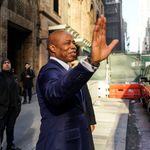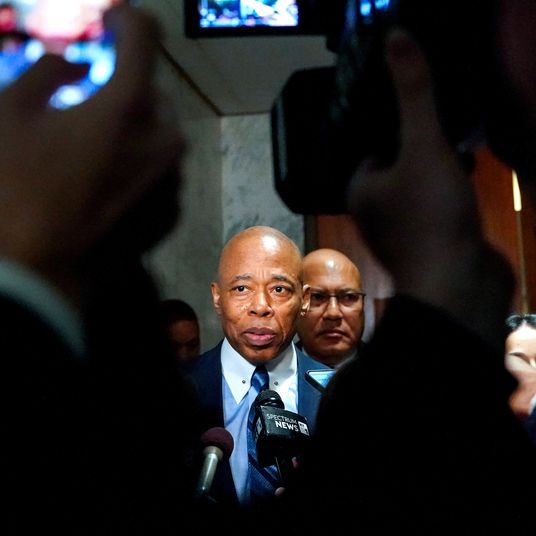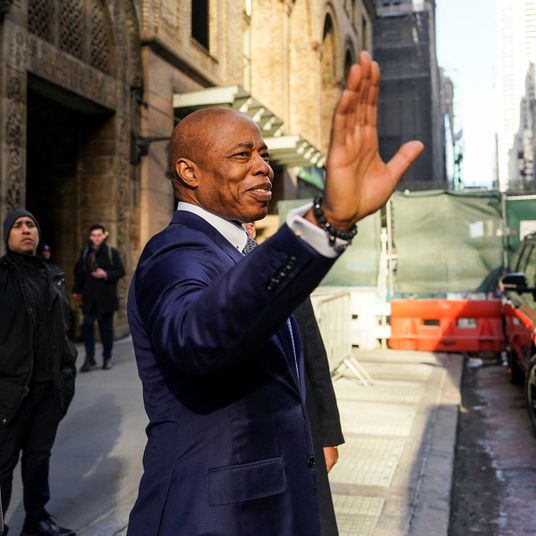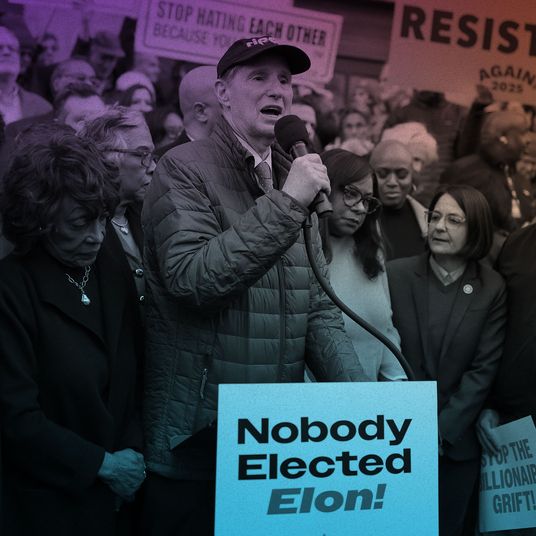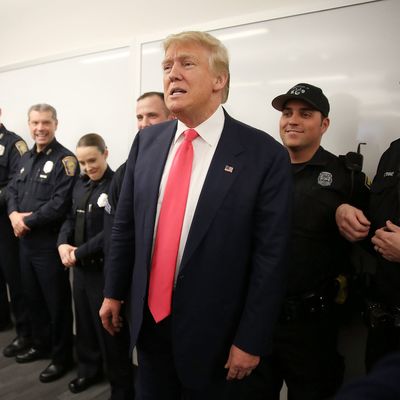
Donald Trump ran an ethnonationalist cult-of-personality presidential campaign, in which his status as a (real) nonpolitician and (imaginary) business genius would allow him to transcend and solve every policy problem. He has retained the ethnonationalist themes, while abandoning, one by one, almost every other populist element differentiating him from the generic Republican brand.
The neutering of the nonracial elements of Trump’s populism has been a continuous process. “After listening for ten minutes, I realized it’s not so easy,” Trump told The Wall Street Journal this week. He was specifically referring to North Korea, which he had believed China could handle quickly and easily — but, after a short historical education, realized is a knotty issue replete with trade-offs. Yet that line could easily be applied to every issue Trump has been educated about.
As he has come into contact with a concrete agenda, every heterodox promise has given way to conventional GOP positions. Trump’s pledge not to cut Medicaid while replacing Obamacare with a terrific plan that would include “insurance for everybody,” with better coverage than they have now, turned into endorsement of a conventional Republican plan that would cut hundreds of billions of dollars from Medicaid and throw tens of millions of people off their insurance. He has oriented his domestic policy around traditional Republican priorities: deregulation, especially of the financial sector and fossil fuels, and regressive tax cuts. Report after report finds chief executive officers streaming into the White House and essentially dictating policy.
The economic-nationalist elements of Trump’s agenda have all either quietly disappeared or been reversed outright. He has ignored his loud promise to renegotiate NAFTA. He has admitted that China, another longtime bête noir, is not, in fact, a currency manipulator. He came out in favor of the Export-Import Bank, after Boeing’s CEO educated him on it (“Instinctively, you would say, ‘Isn’t that a ridiculous thing?’” he told The Wall Street Journal. “It turns out that … lots of small companies are really helped!”) and turned his ballyhooed lobbyist ban into Swiss cheese. On economic policy, Trump has become a conventional party man whose ideas reflect the agenda of the lobbyists and wealthy individuals who have his ear.
His reversal on foreign policy is more dramatic. Having once denounced NATO, he now praises it. (“It was once obsolete; it is no longer obsolete.”) He has brought Russia hawks into his administration and ceased lavishing Vladimir Putin with praise (in part because doing so lends even more credence to the ongoing investigation of his campaign’s cooperation with Russia’s election interference). After repeatedly lambasting the Obama administration for intervening in Syria, which he called a “quagmire” — noting, “Assad is killing ISIS” — he attacked Assad for using chemical weapons against civilians.
Eli Lake reports that H. R. McMaster, Trump’s chief national security adviser, is formulating plans to send tens of thousands of ground troops to Syria for an extended campaign to destroy ISIS and allow for reconstruction afterward — i.e., an occupation. That is an astonishing turn for a president who has not only presented himself as an original opponent of the Iraq War, but endlessly lamented the sums spent on the war and the occupation, which he said could have been used for rebuilding the United States. Indeed, Trump used his imagined status as farsighted Iraq War–opponent to beat back every attack on his manifest ignorance of foreign policy, during both the primary and the general election. There is no telling whether Trump will follow McMaster’s plan; but the mere fact that he has ceded so much authority to a conventionally hawkish interventionist, after having ridiculed his party’s neoconservative wing, shows how far he has lurched already. The ideological distance between Trump’s economic and foreign policy and George W. Bush’s has collapsed.
From the perspective of 2017, more than eight years after Bush departed office, the comparison between the two presidents may sound comforting. That is largely because Bush has disappeared into his painting studio, his reputation benefitting from both his general absence from the political scene and the particular contrast with his frightening, orange quasi-nemesis. It is easy to look back on Bush’s tenure as comparatively benign — but Bush’s presidency was a period of gross misgovernance. His legacy includes not only Iraq and Katrina, but his obsession with cutting taxes for the rich, a comprehensive fealty to the business lobby, rampant corruption, refusal to take any steps to limit climate change, and a deregulatory agenda that set the conditions for the worst financial crisis since the Great Depression.
The Bush presidency was the most comprehensive governing failure of any administration since at least Herbert Hoover, and it ought to have poisoned the party’s national brand as deeply as it did Hoover’s GOP (which did not win another presidential election for twenty years). But the Republican Party managed to largely skirt the reputational fallout from the Bush catastrophe. It did so, in part, through the tea party: Conservatives hailed right-wing protests against Barack Obama as a call for ideological purity, cleansing the supposed big-government, cronyist tendencies of the Bush administration. The Republican Party of the Obama era insisted it had learned the lessons of the Bush years, when its agenda had devolved into little more than shoveling cash to K Street. The post-Bush GOP was allegedly sadder and wiser and filled with righteous abhorrence for the temptations of lobbyists and deficit spending.
Those lessons have all been forgotten. The Republican government, under Trump, has retraced the steps it took under Bush — from the obsession with tax cuts for the rich, to the vanishing line between the party’s paid lobbyists and its public servants. The reality is that, contrary to the willful misreading of conservatives elites, the tea-party revolution was not fundamentally a reaction against deficits or crony capitalism: It was a heavily racialized backlash against social change. And that spirit — the true animating spirit of the grassroots right — has lived on in Trump’s presidency.
My magazine story from a few weeks ago identified Trump’s ethnonationalism as the one clearly successful strand of his presidency. Trump has drawn from a relatively continuous line of thought, running from his early history as a landlord who excluded African-Americans, to a demagogue who publicly demanded the execution of five innocent minority teenagers, to a politician who ultimately brought the alt-right into the Republican coalition. His agenda for law enforcement, immigration, and national identity has reinforced the unifying ethnonationalist theme that allowed him to prevail over his more orthodox Republican competitors. In the weeks since my piece was published, that agenda has continued to race forward. The Department of Homeland Security is ramping up its capacity to assemble Trump’s promised deportation force. And the Department of Justice is eliminating a commission on forensic science, which had refuted some questionable methods used by law enforcement.
As my essay argued, Trump’s ethnonationalism reverses a trend in the Republican Party: Beginning with Bush, it had repudiated its Southern strategy and attempted to craft a racially inclusive message that would broaden the constituency for its oligarchic economic agenda. Bush and his ideological heirs sought to compromise on immigration while taking seriously minority concerns about discriminatory law enforcement. Trump has reversed Bush’s aspiration for a racially inclusive party completely, while rediscovering his economic blueprint.
The Trumpian mix of K Street economics and Breitbartian racial messaging is not a perfectly natural one. Trump’s vicious ethnonationalism makes his wealthy advisers and donors (many of them the same people) uncomfortable, especially the portions that disrupt their transborder workforce. And Trump’s elitist economic policy is the opposite of what his downscale white base thought he would deliver. But it fits together closely enough to function. The political reality Trump has discovered through trial and error is that he is delivering each constituency the thing it most craves. Trump’s white-identity politics satisfy his voting base enough to make his plutocratic economics tolerable. And the financial and political elite are willing to swallow their qualms about his ugly ethnonationalism because they are going to get paid. If you thought George W. Bush was generally swell, but too racially inclusive, you are going to like Trump’s presidency.





